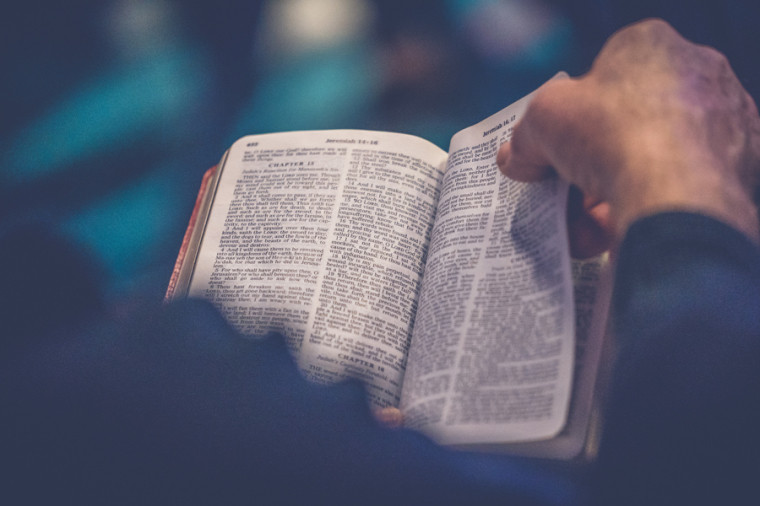
It is for freedom that Christ has set us free! This verse serves as a declaration of the freedom that is ours because of what Christ accomplished: Christ has set us free! In Paul's letter to the Galatians, he does not appeal to his readers to fight to be free. Our freedom is not the result of our hard fought battle. We have not liberated ourselves by our own efforts — it isn't possible to do that. But now that Christ has given us our freedom, it is our responsibility to live in that freedom.
An often-used analogy is this: Imagine a prisoner who has been imprisoned for his whole life, suddenly finding out that he has been pardoned and set free. He did nothing to accomplish his freedom, but there he stands, outside the prison walls, for the first time in his life, a free man.
Our imprisonment is a major theme in Paul's letter to the Galatians: "The Scripture declares that the whole world is a prisoner of sin" (chapter 3, verse 22). "We were held prisoners by the law, locked up" (chapter 3, verse 23). "We were in slavery under the basic principles of the world" (chapter 4, verse 3). So there is no doubt about the character of our slavery. Paul says that we were prisoners under the judgment of the Law, condemned to live under its restrictions and limits without any hope of achieving or earning freedom by our obedience to the Law. After all, all the Law could do was point out our breaking of the Law.
Our release from slavery and prison are parallel themes in the letter: Jesus Christ "gave himself for our sins to rescue us from the present evil age" (chapter 1, verse 4). "Christ redeemed us from the curse of the law" (3 verse 13). "God sent his Son . . . to redeem those under law" (chapter 4, verses 4–5). "Therefore brothers, we are not children of the slave woman, but of the free woman" (chapter 4, verse 31).
Paul clearly explains the nature of our freedom; we have been delivered from the judgment of the Law of God, so we no longer live under its disciplinary regulations. We are now children of the free woman, who stands for the promise of freedom. Our lives are no longer imprisoned by the fear of breaking the Commandments. Instead, we are able to walk with God intimately.
Redemptive, Liberating
Another theme of this letter is the redemptive, liberating act of Christ that sets us free from slavery. By dying on the cross, he took the curse of the Law for us (chapter 3, verse 13) and set us free. Because when we believe in the message of Christ crucified, we receive the Spirit (chapter 3, verses 1–2) and we ourselves can take part in the benefits of the cross. We can then view ourselves to have been crucified with Christ, and set free from the demands of the Law, and are now enabled to live for God by the indwelling life of Christ inside us (chapter 2, verses 19–20). We have been set free, for freedom (chapter 5, verse 1).
These major themes in Paul's letter, of slavery, freedom and the liberating act of Christ are summed up in the declaration and affirmation of Galatians chapter 5, verse 1: "It is for freedom that Christ has set us free." That indicative is then followed by an imperative. "Stand firm, then." What we must do (the imperative) is always based on what God has already done (the indicative). So, what God has done gives us the opportunity and power to do what we need to do.
Paul often urges his readers to stand firm: "Stand firm in the faith" (1 Corinthians chapter 16, verse 13). "Stand firm in one spirit" (Philippians chapter 1, verse 27). "Stand firm in the Lord" (Philippians chapter 4, verse 1). Here in Paul's letter to the Galatians he asks them to stand firm in the freedom that Christ has given them.
Oxen were often harnessed by a yoke to a heavily laden cart, straining to pull the burden uphill, while being flailed and goaded by sharp sticks. Paul uses the word yoke to refer to the yoke of the burden of the Law. Through Paul's statement in verse three, we can see that the crushing weight of this yoke is to obey the whole Law. The yoke of the Law is a yoke of slavery, because it positions us to carry the burden of commandments we cannot keep while we live under curses we deserve for being disobedient.
Hallelujah
But, Hallelujah, God sent his Son to take this heavy yoke off our shoulders and to take it upon himself. Since Jesus has freed us from this yoke of slavery, we must not take it back from him and place it on ourselves again. In direct contrast to the yoke of slavery under the Law, Christ's yoke is easy and his burden is light (Matthew chapter 11, verse 30).
In verses 5–6, Paul goes on to paint a picture of how freedom in Christ is maintained. Both verses focus on faith. Faith in Christ is our only way to protect our freedom in Christ. Paul clearly describes what this life of faith is like, echoing what he has already taught in the preceding chapters of this letter. He also introduces the themes of the rest of his letter to the Galatians.
First, the life of faith is life by the Spirit: "by faith we eagerly await through the Spirit" (verse 5). By faith in the Gospel we have received the Holy Spirit, and we now "live by the Spirit" (chapter 5, verse 16), "are led by the Spirit" (chapter 5, verse 18) and "keep in step with the Spirit" (chapter 5, verse 25). Having the presence of the Spirit marks us as the children of God (chapter 4, verse 6), and the power of the Spirit produces the character of God within us (chapter 5, verse 22–23).
Second, a life of faith is a life of confident expectation of righteousness. By faith we eagerly await through the Spirit the righteousness for which we hope (verse 5). Paul focuses here on the future righteousness which is ours when God completes his work in us through His Spirit. By the power of His Spirit, God produces righteousness in us. Our righteousness is always a gift received from God by faith.
Third, union with Christ is what matters in this life of faith, not union with the Jews or Gentiles or any other racial or social group. The world's divisions between Jew and Greek, slave and free, male and female have been destroyed in our union with one another in Christ (chapter 3, verse 28).
Fourth, our life of faith is a life of loving one another. Faith expressing itself through love is the only thing that counts (verse 6). Faith in Christ enables and empowers us to fulfil the true intent of all the Law by serving one another (verses 13–14). The evidence of true faith will be genuine love, as true faith in Christ is inevitably expressed through love.
Paul's explanation of the life of faith enables us to see how faith in Christ is the only way to maintain our freedom in Christ.

Lehi Duncan's previous articles may be viewed at www.pressserviceinternational.org/lehi-duncan.html